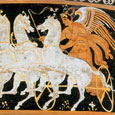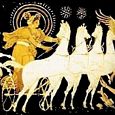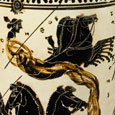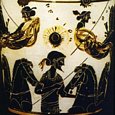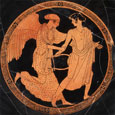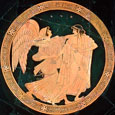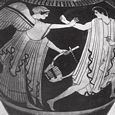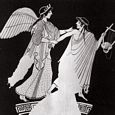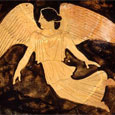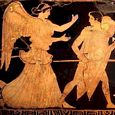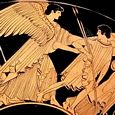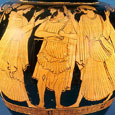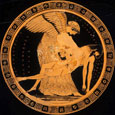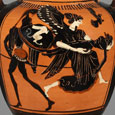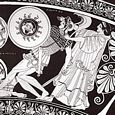EOS
Greek Name
Ηως
Transliteration
Êôs
Roman Name
Aurora
Translation
Dawn (êôs)
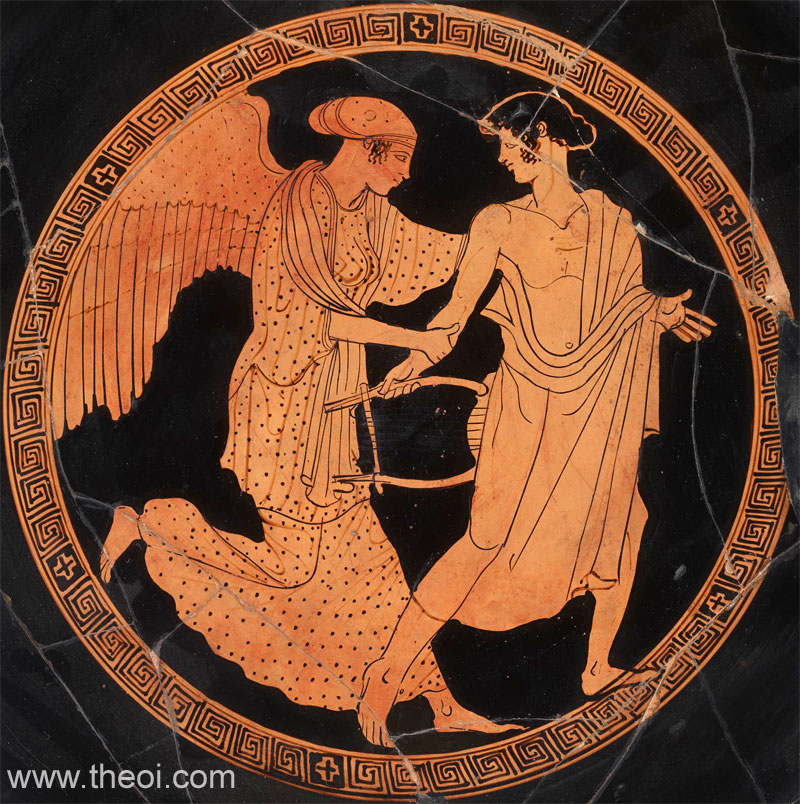
EOS was the rosy-fingered goddess of the dawn. She and her siblings Helios (the Sun) and Selene (the Moon) were numbered amongst the second-generation Titan gods. Eos rose into the sky from the river Okeanos (Oceanus) at the start of each day, and with her rays of light dispersed the mists of night.
She was depicted either driving a chariot drawn by winged horses or borne aloft on her own wings.
Eos had an unquenchable desire for handsome young men, some say as the result of a curse laid upon her by the goddess Aphrodite. Her lovers included Orion, Phaethon, Kephalos (Cephalus) and Tithonos (Tithonus), three of which she ravished away to distant lands. The Trojan prince Tithonos became her official consort. When the goddess petitioned Zeus for his immortality, she neglected also to request eternal youth. In time he shrivelled up by old age and transformed into a grasshopper.
Eos was closely identified with Hemera, the primordial goddess of day. In some myths--such as the tales of Orion and Kephalos--Eos stood virtually as a non-virginal substitute for Artemis.
FAMILY OF EOS
PARENTS
[1.1] HYPERION & THEIA (Hesiod Theogony 371, Apollodorus 1.8, Hyginus Pref, Ovid Fasti 5.159)
[1.2] HYPERION & EURYPHAESSA (Homeric Hymn 31 to Helios)
[2.1] PALLAS (Ovid Fasti 4.373, Valerius Flaccus 2.72)
OFFSPRING
[1.1] THE ANEMOI (BOREAS, ZEPHYROS, NOTOS), THE ASTRA (EOSPHOROS) (by Astraios) (Hesiod Theogony 378, Apollodorus 1.9)
[1.2] BOREAS, ZEPHYROS, NOTOS (by Astraios) (Hyginus Preface)
[1.3] BOREAS, ZEPHYROS, NOTOS, EUROS, EOSPHOROS (by Astraios) (Nonnus Dionysiaca 6.18 & 37.70 & 47.340)
[1.4] HESPEROS (by Kephalos) (Hyginus Astronomica)
[2.1] ASTRAIA (by Astraios) (Hyginus Astronomica)
[3.1] MEMNON, EMATHION (by Tithonos) (Hesiod Theogony 984, Apollodorus 3.147)
[3.2] MEMNON (by Tithonos) (Aethiopis Frag 1, Quintus Smyrnaeus 2.549, Pindar Nemean 6 str3, Diodorus Siculus 4.75.4, Callistratus Descriptions 9, Ovid Fasti 4.713)
[3.3] MEMNON (Philostratus Elder 1.7, Callistratus Descriptions 1)
[4.1] PHAETHON-TITHONOS (by Kephalos) (Hesiod Theogony 984, Apollodorus 3.181, Pausanias 1.3.1)
ENCYCLOPEDIA
EOS (Êôs), in Latin Aurora, the goddess of the morning red, who brings up the light of day from the east. She was a daughter of Hyperion and Theia or Euryphassa, and a sister of Helios and Selene. (Hes. Theog. 371, &c.; Hom. Hymn in Sol. ii.) Ovid (Met. ix. 420, Fast. iv. 373) calls her a daughter of Pallas. At the close of night she rose front the couch of her beloved Tithonus, and on a chariot drawn by the swift horses Lampus and Phaëton she ascended up to heaven from the river Oceanus, to announce the coming light of the sun to the gods as well as to mortals. (Hom. Od. v. 1, &c., xxiii. 244; Virg. Aen. iv. 129, Georg. i. 446; Hom. Hymn in Merc. 185; Theocrit. ii. 148, xiii. 11.) In the Homeric poems Eos not only announces the coming Helios, but accompanies him throughout the day, and her career is not complete till the evening; hence she is sometimes mentioned where one would have expected Helios (Od. v. 390, x. 144); and the tragic writers completely identify her with Hemera, of whom in later times the same myths are related as of Eos. (Paus. i. 3. § 1, iii. 18. § 7.) The later Greek and the Roman poets followed, on the whole, the notions of Eos, which Homer had established, and the splendour of a southern aurora, which lasts much longer than in our climate, is a favourite topic with the ancient poets. Mythology represents her as having carried off several youths distinguished for their beauty. Thus she carried away Orion, but the gods were angry at her for it, until Artemis with a gentle arrow killed him. (Hom. Od. v. 121.) According to Apollodorus (i. 4. § 4) Eos carried Orion to Delos, and was ever stimulated by Aphrodite. Cleitus, the son of Mantius, was carried by Eos to the seats of the immortal gods (Od. xv. 250), and Tithonus, by whom she became the mother of Emathion and Memnon, was obtained in like manner. She begged of Zeus to make him immortal, but forgot to request him to add eternal youth. So long as he was young and beautiful, she lived with him at the end of the earth, on the banks of Oceanus ; and when he grew old, she nursed him, until at length his voice disappeared and his body became quite dry. She then locked the body up in her chamber, or metamorphosed it into a cricket. (Hom. Hymn. in Ven. 218, &c.; Horat. Carm. i. 22. 8, ii. 16. 30; Apollod. iii. 12. § 4; Hes. Theog. 984; Serv. ad Virg. Georg. i. 447, iii. 328, Aen. iv. 585.) When her son Memnon was going to fight against Achilles, she asked Hephaestus to give her arms for him, and when Memnon was killed, her tears fell down in the form of morning dew. (Virg. Aen. viii. 384.) By Astraeus Eos became the mother of Zephyrus, Boreas, Notus, Heosphorus, and the other stars. (Hesiod. Theog. 378.) Cephalus was carried away by her from the summit of mount Hymetttus to Syria, and by him she became the mother of Phaëton or Tithonus, the father of Phaëton; but afterwards she restored her beloved to his wife Procris. (Hes. Theog. 984; Apollod. iii. 14. § 3; Paus. i. 3. § 1; Ov. Met. vii. 703, &c.; Hygin. Fab 189.) Eos was represented in the pediment of the kingly stoa at Athens in the act of carrying off Cephalus, and in the same manner she was seen on the throne of the Amyclaean Apollo. (Paus. i. 3. § 1, iii. 18. § 7.) At Olympia she was represented in the act of praying to Zeus for Memnon. (v. 22. 2.) In the works of art still extant, she appears as a winged goddess or in a chariot drawn by four horses.
Source: Dictionary of Greek and Roman Biography and Mythology.
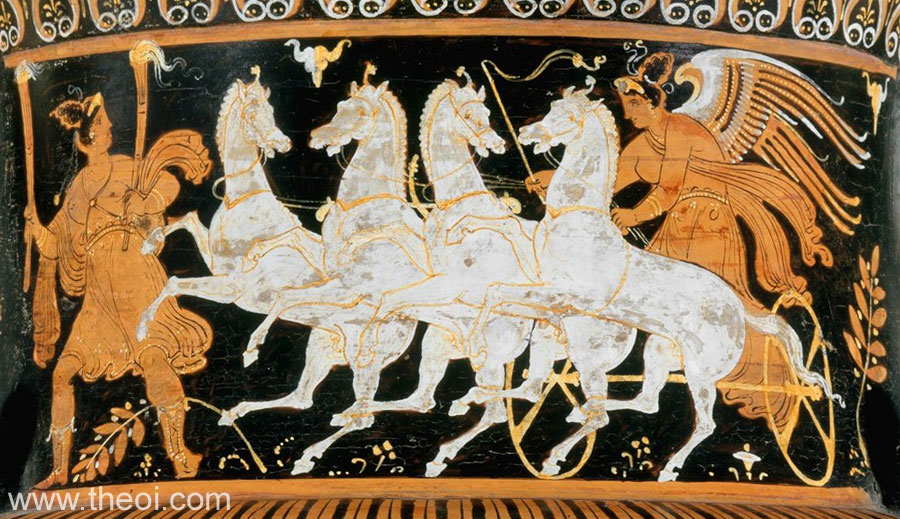
ALTERNATE NAME SPELLINGS
Greek Name
Αυως
Αως
Transliteration
Auôs
Aôs
Latin Spelling
Eos
Eos
Translation
Dawn (Doric sp.)
Dawn (Aeolic sp.)
CLASSICAL LITERATURE QUOTES
PARENTAGE OF EOS
Hesiod, Theogony 371 ff (trans. Evelyn-White) (Greek epic C8th or C7th B.C.) :
"And Theia was subject in love to Hyperion and bare great Helios (Helius, Sun) and clear Selene (Moon) and Eos (Dawn) who shine upon all that are on earth and upon the deathless Gods who live in the wide heaven."
Homeric Hymn 31 to Helius (trans. Evelyn-White) (Greek epic C7th - 4th B.C.) :
"For Hyperion wedded glorious Euryphaessa, his own sister, who bare him lovely children, rosy-armed (rhododekhos) Eos (Dawn) and rich-tressed Selene (Moon) and tireless Helios (Sun)."
Pseudo-Apollodorus, Bibliotheca 1. 8 (trans. Aldrich) (Greek mythographer C2nd A.D.) :
"The Titanes (Titans) had children . . . Hyperion and Theia had Eos (Dawn), Helios (Sun), and Selene (Moon)."
Pseudo-Hyginus, Preface (trans. Grant) (Roman mythographer C2nd A.D.) :
"From Hyperion and Aethra [Clear Blue Sky] : Sol [Helios], Luna [Selene], Aurora [Eos]."
Ovid, Fasti 4. 373 ff (trans.Boyle) (Roman poetry C1st B.C. to C1st A.D.) :
"When Pallantis (Daughter of Pallas) [i.e. Eos, Aurora] next gleams in heaven and stars flee."
Ovid, Fasti 5. 159 ff :
"Hyperion's daughter [Eos the Dawn] expels the stars."
Valerius Flaccus, Argonautica 2. 72 ff (trans. Mozley) (Roman epic C1st A.D.) :
"The fires of the maid Pallantis (daughter of Pallas) [i.e. Eos the dawn]."
MOTHER OF THE STARS & WINDS
Hesiod, Theogony 378 ff (trans. Evelyn-White) (Greek epic C8th or C7th B.C.) :
"And Eos (Dawn) bare to Astraios (Astraeus, the Starry) the strong-hearted Anemoi (Winds), brightening Zephyros (Zephyrus, West Wind), and Boreas (North Wind), headlong in his course, and Notos (Notus, South Wind),--a goddess mating in love with a god.
And after these Erigenia (the Early-Born) [Eos] bare the star Eosphoros (Dawn-bringer) [the planet Venus], and the gleaming Astra (Stars) with which heaven is crowned."
Pseudo-Apollodorus, Bibliotheca 1. 9 (trans. Aldrich) (Greek mythographer C2nd A.D.) :
"Eos (Dawn) and Astraios (Astraeus) were parents of Anemoi (Winds) and Astra (Stars)."
Quintus Smyrnaeus, Fall of Troy 2. 680 ff :
"At their mother's [Eos'] hest all the light Aetai (Winds) [Anemoi] of the Dawn took hands, and slid down one long stream of sighing wind to Priamos' (Priam's) plain [to retrieve the body of their dead brother Memnon.]"
Pseudo-Hyginus, Preface (trans. Grant) (Roman mythographer C2nd A.D.) :
"From Astraeus and Aurora [Eos] : Zephyrus, Boreas, Notus, Favonius [Zephyros]."
Pseudo-Hyginus, Astronomica 2. 42 :
"Some have said it [Hesperos (Hesperus)] represents the son of Aurora [Eos] and Cephalus, who surpassed many in beauty."
Nonnus, Dionysiaca 47. 340 ff (trans. Rouse) (Greek epic C5th A.D.) :
"[Ariadne abandoned on Naxos by Theseus laments :] ‘Who stole the man of Athens [Theseus]? . . . If it is Notos (Notus, the South Wind), if bold Euros (Eurus, the East Wind), I appeal to Eos and reproach the mother of the blustering Anemoi (Winds), lovelorn herself.’"
APHRODITE & THE CURSE OF EOS
Aphrodite placed a curse upon the goddess Eos causing her to fall in love with a train of mortals--Orion, Tithonos (Tithonus), Kephalos (Cephalus) and Kleitos (Cleitus).
Pseudo-Apollodorus, Bibliotheca 1. 27 (trans. Aldrich) (Greek mythographer C2nd A.D.) :
"Eos, whom Aphrodite tormented with constant passion as punishment for sleeping with Ares."
LOVE OF EOS & ORION
Eos loved the giant Orion, a hunter who was transformed into a constellation at death.
Homer, Odyssey 5. 118 ff (trans. Shewring) (Greek epic C8th B.C.) :
"[Kalypso (Calypso) complains to Hermes :] ‘You are merciless, you gods, resentful beyond all other beings; you are jealous if without disguise a goddess makes a man her bedfellow, her beloved husband. So it was when Eos of the rosy fingers chose out Orion; you gods who live in such ease yourselves were jealous of her until chaste Artemis in her cloth-of-gold visited him with her gentle shafts and slew him in Ortygia [island of Delos].’"
Pseudo-Apollodorus, Bibliotheca 1. 27 (trans. Aldrich) (Greek mythographer C2nd A.D.) :
"Eos, whom Aphrodite tormented with constant passion as punishment for sleeping with Ares, fell in love with Orion and took him off with her to Delos."
Nonnus, Dionysiaca 4. 192 ff (trans. Rouse) (Greek epic C5th A.D.) :
"[The goddess Harmonia laments her love for a mortal man :] ‘I will proclaim how Orion loved Erigeneia [Eos the Dawn], and I will recall the match of Kephalos (Cephalus); if I go to the misty sunset, my comfort is Selene herself who felt the same for Endymion upon Latmos.’”
Nonnus, Dionysiaca 5. 516 ff :
"Shining Eos carried off Orion for a bridegroom."
Nonnus, Dionysiaca 11. 388 ff :
"He would have been bridegroom of Eos Fairtress; since he shone lovelier than Kephalos (Cephalus), was handsomer of face than Orion, he alone outdid them with his rosy skin."
For MORE information on this giant see ORION
LOVE OF EOS & CLEITUS
Homer, Odyssey 15. 250 ff (trans. Shewring) (Greek epic C8th B.C.) :
"Mantios (Mantius) [son of the seer Melampos] he begot Polypheides (Polyphides) and Kleitos (Cleitus), but Eos of the golden robe snatched Kleitos away for his beauty's sake to dwell with the Deathless Ones."
LOVE OF EOS & CEPHALUS
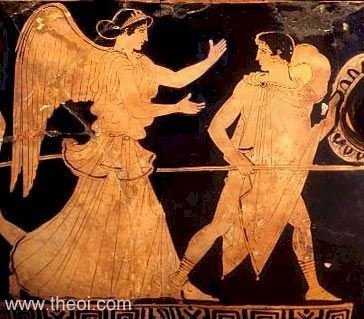
Hesiod, Theogony 984 ff (trans. Evelyn-White) (Greek epic C8th or C7th B.C.) :
"And to Kephalos (Cephalus) she [Eos] bare a splendid son, strong Phaethon, a man like the gods, whom, when he was a young boy in the tender flower of glorious youth with childish thoughts, laughter-loving Aphrodite seized and caught up and made a keeper of her shrine by night, a divine spirit."
Pseudo-Apollodorus, Bibliotheca 1. 86 (trans. Aldrich) (Greek mythographer C2nd A.D.) :
"Kephalos (Cephalus) [son of Deion] was another whom Eos loved and kidnapped."
Pseudo-Apollodorus, Bibliotheca 3. 181 :
"Kephalos (Cephalus), whom Eos developed a passion for and kidnapped. They had sex in Syria, and she borne him a son Tithonos (Tithonus)." [N.B. Tithonos is usually called the husband, not son, of Eos.]
Pausanias, Description of Greece 1. 3. 1 (trans. Jones) (Greek travelogue C2nd A.D.) :
"On the tiling of this portico [the Royal Portico at Athens] are images of baked earthenware . . . Hemera (Day) [Eos] carrying away Kephalos (Cephalus), who they say was very beautiful and was ravished by Hemera, who was in love with him. His son was Phaithon (Phaethon),afterwards ravished by Aphrodite . . . and made a guardian of her temple. Such is the tale told by Hesiod, among others, in his poem on women."
Pausanias, Description of Greece 3. 18. 10 - 16 :
"[Amongst the scenes depicted on the throne of Apollon at Amyklai (Amyclae) near Sparta :] There is Kephalos (Cephalus), too, carried of by Hemera (Day) [Eos] because of his beauty."
Antoninus Liberalis, Metamorphoses 41 (trans. Celoria) (Greek mythographer C2nd A.D.) :
"Kephalos (Cephalus) was a handsome and brave youth and he goddess Eos (Dawn) fell in love with him because of his beauty. She kidnapped him, keeping him at home as her lover."
Pseudo-Hyginus, Fabulae 270 (trans. Grant) (Roman mythographer C2nd A.D.) :
"Those who were most handsome . . . Cephalus, son of Pandion, whom Aurora [Eos] loved. Tithonus, husband of Aurora."
Pseudo-Hyginus, Fabulae 189 :
"When Cephalus, who was fond of hunting, had gone to the mountain in the early morning, Aurora [Eos], wife of Tithonus, fell passionately in love with him, and begged for his embrace. He refused, since he had given his promise to Procris. Then Aurora said : ‘I don't want you to break faith, unless she has done so before you.’ And so she changed his form into that of a stranger, and gave him beautiful gifts to give to Procris. When Cephalus had come in his changed form, he gave the gifts to Procris and lay with her. Then Aurora took away his new appearance. When Procris saw Cephalus, she knew she had been deceived by Aurora, and fled to the island of Crete . . .
[Procris was eventually reunited with Cephalus] nevertheless out of fear of Aurora she followed him to watch him in the early morning, and hid among the bushes. When Cephalus saw the bushes stir, he hurled the unavoidable javelin, and killed his wife."
Ovid, Metamorphoses 7. 700 ff (trans. Melville) (Roman epic C1st B.C. to C1st A.D.) :
"Within two months after our [Kephalos (Cephalus) and Prokris' (Procris')] marriage, while I [Kephalos] spread my nets to catch the antlered deer, the saffron Aurora [Eos the Dawn], above Hymettus' ever-flowery peak, saw me at daybreak as the twilight fled, and carried me away against my will. And may the goddess pardon me, if I say what is true : her rosy cheeks are fair, she rules the borderlands of dark and day, she drinks the nectar's honeydew, but I loved Procris, Procris ever in my heart, and Procris on my lips. I spoke of bonds of holy wedlock, of love's fresh delights, my vows so new and my deserted bride, until in rage the goddess cried : ‘Enough of your complaining! Have your Procris! But, if I can see the future, you will rue the day you had her,’ and so sent me back. On my way home the goddess' prophecy began to form, fear that my wife had failed her marriage vows . . . Intent on heartbreak I resolved to test her loyalty with presents. And Aurora [Eos] favoured my fears and changed my form and face (If felt the change) and so I entered Athens unrecognisable and made my way back home . . . [and attempted to seduce his wife in the form of another man. Prokris failed the test and fled him, but the two were eventually reconciled.]
I would go hunting when the sun's first beams coloured the hilltops, as a young man will, roving the woods alone . . . and when my hand had had its fill of sport I used to seek the coolness of the shade and of the breeze, the aura breathing from the chilly dales. I sought the gentle aura in the heat, I waited for the aura, for its balm, my labour's rest. ‘Come, aura,’ I would call, how I remember! ‘soothe me, welcome guest, come to my breast, relieve, as is your way, the heat with which I burn.’ And I might add, so my fate led me on, more blandishments. ‘You comfort and refresh me. For your sake I love the lonely places and the woods; your breath I seek for ever on my lips.’
Some fool who overheard my words mistook the double sense and thought that aura (breeze) called so often was the goddess [Aurora, Eos the Dawn], and I in love. This hasty tell-tale hurried off to Procris and told in whispers my supposed offence. Love will believe too soon. In sudden grief she swooned, they told me, then, restored at last, bemoaned her misery, her cruel fate, accused my honour and, imagining a false offence, feared a mere nothing, feared an insubstantial name, poor soul, and grieved as over a true rival paramour. Yet she had doubts and in her wretchedness hoped she was wrong, refusing to accept the tale or, till her eyes had evidence convict her husband of such villainy.
Next day the gleam of dawn had banished night and out into the woods I went and found good sport and, lying on the grass, I called ‘Come, aura (breeze), come and soothe my weariness! And suddenly, as I spoke, I seemed to hear a sound of moaning, but I called again ‘Come, best and loveliest!’ A falling leaf made a slight rustle and I thought it was some lurking beast and hurled my [magic never-failing] javelin. It was my wife! Clutching her wounded breast, ‘Ay me! Ay me!’ she cried. I knew her voice, my Procris' voice, and like a madman rushed headlong towards the sound. And there, half-dead, her clothes blood-splattered, plucking from the wound the gift (heaven help me!) she had given me, I found her . . .
Exhausted then and dying, these few words she forced herself to murmur : ‘By our vows of wedlock, by the gods of home and heaven, by my deserts, if I have well deserved, by my death's cause, my own still-living love, I beg you, I implore you, not to take Aura [that is, Aurora or Eos] to be your wife in place of my.’ And then at last I learnt of her mistake and told her all. But what did telling help? She slipped away; what little strength was left ebbed with her failing blood; and while her eyes had power still to gaze, she gazed at me, and on my lips her life's last breath was spent; but she looked glad and seemed to die content."
[N.B. "aura" was also the Greek word for breeze. Presumably the Greeks also applied it to Eos mother of the winds.]
Ovid, Heroides 4. 93 ff (trans. Showerman) (Roman poetry C1st B.C. to C1st A.D.) :
"Renowned in the forest was Cephalus, and many were the wild beasts that had fallen on the sod at the piercing of his stroke; yet he did not ill in yielding himself to Aurora's [Eos'] love. Oft did the goddess sagely go to him, leaving her aged spouse [Tithonos]."
Ovid, Heroides 15. 87 ff (trans. Showerman) (Roman poetry C1st B.C. to C1st A.D.) :
"[Phaedra speaks of her love, the hunter Hippolytos :] ‘Lest thou steal him in Cephalus' place, I ever feared, Aurora [Eos].’"
Nonnus, Dionysiaca 27. 1 ff (trans. Rouse) (Greek epic C5th A.D.) :
"Eos (the Dawn) had just shaken off the wing of carefree sleep (Hypnos) and opened the gates of sunrise, leaving the lightbringing couch of Kephalos (Cephalus)."
Nonnus, Dionysiaca 48. 680 ff :
"She had heard that a huntsman Kephalos (Cephalus), from the country of unmothered Athena, was husband of rosecrowned Eos (Dawn)."
LOVE OF EOS & TITHONUS
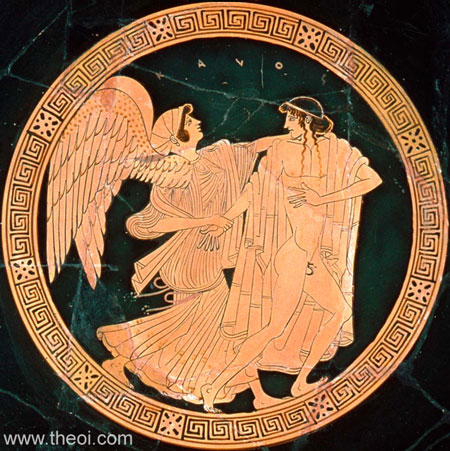
Homer, Iliad 11. 1 ff (trans. Lattimore) (Greek epic C8th B.C.) :
"Eos (Dawn) rose from her bed, where she lay by haughty Tithonos (Tithonus), to carry her light to men and to immortals."
Homer, Odyssey 5. 1 ff (trans. Shewring) (Greek epic C8th B.C.) :
"The goddess Eos (Dawn), who had slept beside Lord Tithonos (Tithonus), was rising now to bring light to immortals and to mortals."
Hesiod, Theogony 984 ff (trans. Evelyn-White) (Greek epic C8th or C7th B.C.) :
"And Eos bare to Tithonos (Tithonus) brazen-crested Memnon, king of the Aithiopes (Ethiopians), and the Lord Emathion."
Homeric Hymn 5 to Aphrodite 218 ff (trans. Evelyn-White) (Greek epic C7th - 4th B.C.) :
"So also golden-throned (khrysothronos) Eos rapt away Tithonos (Tithonus) who was of your race and like the deathless gods. And she went to ask the dark-clouded Son of Kronos (Cronus) [Zeus] that he should be deathless and live eternally; and Zeus bowed his head to her prayer and fulfilled her desire. Too simple was Lady (potnia) Eos: she thought not in her heart to ask for youth for him and to strip him of the slough of deadly age. So while he enjoyed the sweet flower of life he lived rapturously with golden-throned Eos, Erigeneia (Early-Born), by the streams of Okeanos (Oceanus), at the ends of the earth; but when the first grey hairs began to ripple from his comely head and noble chin, Lady Eos kept away from his bed, though she cherished him in her house and nourished him with food and ambrosia and gave him rich clothing. But when loathsome old age pressed full upon him, and he could not move nor lift his limbs, this seemed to her in her heart the best counsel: she laid him in a room and put to the shining doors. There he babbles endlessly, and no more has strength at all, such as once he had in his supple limbs."
Mimnermus Fragment 4 (from Stobaeus, Anthology) (trans. Gerber, Vol. Greek Elegiac) (Greek elegy C7th B.C.) :
"He [Zeus] gave Tithonos (Tithonus) an everlasting evil, old age, which is more terrible than even woeful death."
Sappho, Fragment 58 (from Papyrus) (trans. Campbell, Vol. Greek Lyric I) (C6th B.C.) :
"Not possible to become ageless . . (lacuna) rosy-armed (rhodopakhos) Auos (Eos) .. carrying [Tithonos] to the ends of the earth . . yet age seized him . . immortal wife."
Ibycus, Fragment 289 (from Scholiast on Apollonius of Rhodes) (trans. Campbell, Vol. Greek Lyric II) (C6th B.C.) :
"Ibykos (Ibycus) tells also how Eos carried off Tithonos (Tithonus)."
Pseudo-Apollodorus, Bibliotheca 3. 147 (trans. Aldrich) (Greek mythographer C2nd A.D.) :
"Now Eos, in love with Tithonos (Tithonus), kidnapped him and too him to Aithiopia (Ethiopia), and there after intercourse with him she gave birth to sons Emathion and Memnon."
Callimachus, Aetia Fragment 21 (trans. Trypanis) (Greek poet C3rd B.C.) :
"But when Tito [Eos], having slept with the son of Laomedon [i.e. Tithonos], arose to set the chafing yoke on the neck of the ox [that pulled her chariot]."
Lycophron, Alexandra 16 ff (trans. Mair) (Greek poet C3rd B.C.) :
"Eos was just soaring over the steep crag of Phegion (Phegium) on the swift wings of Pegasos (Pegasus), leaving in his bed by Kerne (Cerne) [a fabled island in the remote East] Tithonos (Tithonus)."
Diodorus Siculus, Library of History 4. 75. 4 (trans. Oldfather) (Greek historian C1st B.C.) :
"Laomedon who begat Tithonos (TIthonus) and Priamos (Priam); and Tithonos, after making a campaign against those parts of Asia which lay to the east of him and pushing as far as Aithiopia (Ethiopia), begat by Eos, as the myths relate, Memnon, who came to the aid of the Trojans and was slain by Akhilleus (Achilles)."
Quintus Smyrnaeus, Fall of Troy 2. 115 ff (trans. Way) (Greek epic C4th A.D.) :
"[Memnon greets King Priamos (Priam) of Troy :] ‘Telling of that strange immortality by Eos (Dawn-goddess) given to his sire [Tithonos], telling of the unending flow and ebb of Tethys, of the sacred flood of Okeanos (Oceanus) fathomless-rolling, of the bounds of Earth that wearieth never of her travail, of where the Sun-steeds leap from orient waves.’"
Quintus Smyrnaeus, Fall of Troy 6. 1 ff :
"Rose Eos (Dawn) from Okeanos (Oceanus) and Tithonos' (Tithonus') bed, and climbed the steeps of heaven, scattering round flushed flakes of splendour."
Athenaeus, Deipnosophistae 1. 6c (trans. Gullick) (Greek rhetorician C2nd to C3rd A.D.) :
"Tithonos (Tithonus) longed for immortality, but now hangs in his chamber, old age has deprived him of all pleasures."
Pseudo-Hyginus, Fabulae 270 (trans. Grant) (Roman mythographer C2nd A.D.) :
"Those who were most handsome . . . Tithonus, husband of Aurora [Eos]."
Ovid, Metamorphoses 9. 420 ff (trans. Melville) (Roman epic C1st B.C. to C1st A.D.) :
"A rumbling argument arose in heaven, the gods all grumbling why others should not be allowed to grant such gifts [the rejuvenating power of the goddess Hebe]. Pallantias [Aurora-Eos] grumbled at her husband's [Tithonos'] age."
Ovid, Fasti 6. 473 ff (trans.Boyle) (Roman poetry C1st B.C. to C1st A.D.) :
"Phrygian Tithonus, you complain your bride [Aurora-Eos] departs."
Ovid, Heroides 16. 199 ff (trans. Showerman) (Roman poetry C1st B.C. to C1st A.D.) :
"[Paris addresses Helene :] ‘Do not disdain a Phrygian for your lord . . . A Phrygian was Aurora's [Eos'] mate [Tithonos]; yet he was carried away by the goddess who sets the last bound to the advance of night.’"
Ovid, Heroides 18. 111 ff :
"Aurora [Eos], the bride of Tithonus, was making ready to chase the night away."
Virgil, Georgics 1. 446 ff (trans. Fairclough) (Roman bucolic C1st B.C.) :
"When Aurora (the Dawn) [Eos] rises pale, as she leaves Tithonus' saffron couch."
Propertius, Elegies 1. 18B (trans. Goold) (Roman elegy C1st B.C.) :
"Aurora [Eos] did not scorn Tithonus, old though he was, or suffer him to lie deserted in the halls of the Dawn: she, as she mounted her car, called the gods unkind and performed unwilling service for the world; him, as she dismounted, she oft fondled in her arms and did not first busy herself with washing her unyoked steeds; him when she embraced, resting near the land of India, she lamented that the day returned again too soon. Deeper her joy that old Tithonus lives than heavy her grief when Memnon died."
Statius, Silvae 1. 2. 43 ff (trans. Mozley) (Roman poetry C1st A.D.) :
"A bold shepherd lad [Tithonos] held thy court on Dardan Ida, though warm-hearted Aurora (the Dawn) [Eos] had preferred thee, and snatched thee up and borne thee in her chariot through the air."
Nonnus, Dionysiaca 15. 279 ff (trans. Rouse) (Greek epic C5th A.D.) :
"There are herdsmen that lie in heavenly beds. Rosy Tithonos (Tithonus) was a bridegroom for whom because of his fine figure lightbringer Eos stayed her car, and caught him up."
Suidas s.v. Andra Tithonon (trans. Suda On Line) (Byzantine Greek lexicon C10th A.D.) :
"Andra Tithonon sparatton kai taratton kai kukon (Attacking, troubling and vexing Old Man Tithonos): That is, [doing so to] someone exceedingly old. From Tithonos (Tithonus), who grew altogether ancient and was changed into a cicada."
EOS, HER SON MEMNON & THE TROJAN WAR
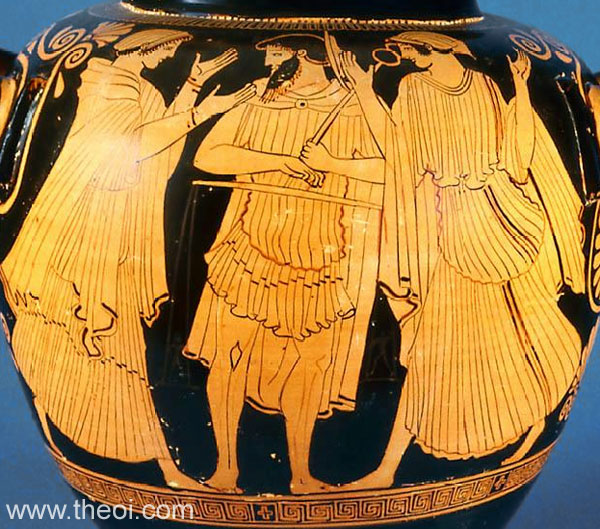
Homer, Odyssey 4. 190 ff (trans. Shewring) (Greek epic C8th B.C.) :
"The great Antilokhos (Antiochus) whom [Memnon] the son of radiant Eos had slain."
Arctinus of Miletus, The Aethiopis Frag 1 (from Proclus, Chrestomathia 2) (trans. Evelyn-White) (Greek epic C8th B.C.) :
"[In the Trojan War, after the death of Penthesilea :] Then Memnon, the son of Eos, wearing armour made by Hephaistos (Hephaestus), comes to help the Trojans, and Thetis tells her son about Memnon. A battle takes place in which Antilokhos (Antilochus) is slain by Memnon and Memnon by Akhilleus (Achilles). Eos then obtains of Zeus and bestows upon her son immortality."
Pindar, Nemean Ode 6. 50 ff (trans. Conway) (Greek lyric C5th B.C.) :
"The Aithiopian (Ethiopian) race, when mighty Memnon came not home again . . . when great Akhilleus (Achilles) stepped down from his chariot to the ground, and slew the son of shining Eos (Dawn) with his fell-pointed spear."
Aeschylus, Memnon and Psychostasia (lost plays) (Greek tragedy C5th B.C.) :
Aeschylus told the story of Memnon, son of Eos the Dawn), in two plays entitled Memnon and Psychostasia (The Weighing of Souls). Smyth (L.C.L.) summarises the second of these : "In the Psychostasia Zeus was represented as holding aloft the balance, in the scales of which were the souls of Achilles and Memnon, while beneath each stood Thetis and Eos, praying each for the life of her son."
Pseudo-Apollodorus, Bibliotheca E5. 3 (trans. Aldrich) (Greek mythographer C2nd A.D.) :
"Memnon, son of Tithonos (Tithonus) and Eos, brought a large force of Aithiopians (Ethiopians) to Troy . . . He was himself killed by Akhilleus (Achilles)."
Pausanias, Description of Greece 5. 19. 1 (trans. Jones) (Greek travelogue C2nd A.D.) :
"[Amongst the scenes depicted on the chest of Kypselos (Cypselus) dedicated at Olympia :] Akhilleus (Achilles) and Memnon are fighting; their mothers [Thetis and Eos] stand by their side."
Pausanias, Description of Greece 5. 22. 2 :
"By the side of what is called the Hippodamium [at Olympia] is a semicircular stone pedestal, and on it are Zeus, Thetis, and Hemera (Day) [i.e. Eos] entreating Zeus on behalf of her children. These are on the middle of the pedestal. There are Akhilleus (Achilles) and Memnon, one at either edge of the pedestal, representing a pair of combatants in position."
Quintus Smyrnaeus, Fall of Troy 2. 185 ff (trans. Way) (Greek epic C4th A.D.) :
"[Memnon arrives at Troy :] The warrior-son [Memnon] of [Eos] she who brings Light to the world, the Child of Mists (Phaesphoros Erigeneia). Now swelled his mighty heart with eagerness to battle with the foe forthright. And Eos (Dawn) with most reluctant feet began to climb Heaven's broad highway."
Quintus Smyrnaeus, Fall of Troy 2. 289 ff :
"[In the Trojan War :] [Phereus and Thrasymedes] vainly essayed to slay him [Memnon], as they hurled the long spears, but the lances glanced aside far from his flesh : Erigeneia (the Dawn-queen) [Eos] turned them thence."
Quintus Smyrnaeus, Fall of Troy 2. 418 ff :
"[Memnon addresses Akhilleus (Achilles) when they meet in battle :] ‘Of birth divine am I, Eos' (the Dawn-queen's) mighty son, nurtured afar by lily-slender Hesperides, beside the River Okeanos (Oceanus). Therefore not from thee nor from grim battle shrink I, knowing well how far my goddess-mother doth transcend a Nereis (Nereid), whose child thou vauntest thee. To Gods and men my mother bringeth light; on her depends the issue of all things, works great and glorious in Olympos wrought whereof comes blessing unto men. But thine--she sits in barren crypts of brine.’"
Quintus Smyrnaeus, Fall of Troy 2. 490 ff :
"[Akhilleus (Achilles) and Memnon engage in battle :] But when long lengthened out the conflict was of those two champions, and the might of both in that strong tug and strain was equal-matched, then, gazing from Olympos' far-off heights, the Gods joyed, some in the invincible son of Peleus, others in the goodly child of old Tithonos (Tithonus) and Eos (the Queen of Dawn). Thundered the heavens on high from east to west . . . and trembled for her son Erigeneia (the Child of the Mist) as in her chariot through the sky she rode. Marvelled the Daughters of the Sun [Horai, Horae] who stood near her, around that wondrous splendour-ring traced for the race-course of the tireless sun by Zeus, the limit of all Nature's life and death, the dally round that maketh up the eternal circuit of the rolling years. And now amongst the Blessed bitter feud had broken out; but by behest of Zeus the twin Keres (Fates) suddenly stood beside these twain, one dark--her shadow fell on Memnon's heart; one bright--her radiance haloed Peleus' son [Akhilleus]. And with a great cry the Immortals saw, and filled with sorrow they of the one part were, they of the other with triumphant joy."
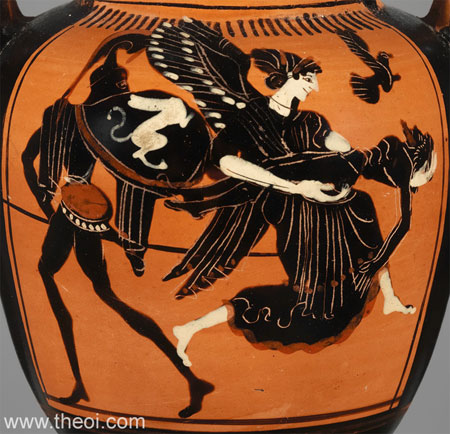
Quintus Smyrnaeus, Fall of Troy 2. 549- 815 :
"[Akhilleus (Achilles) slays Memnon with his sword :] Then groaned Eos (Dawn), and palled herself in clouds, and earth was darkened. At their mother's hest all the light Aetai (Winds) [Anemoi] took hands, and slid down one long stream of sighing wind to Priamos' (Priam's) plain, and floated round the dead, and softly, swiftly caught they up, and bare through silver mists Eos' (the Dawn's) son, with hearts sore aching for their brother's fall, while moaned around them all the air. As on they passed, fell many blood-gouts from those pierced limbs down to the earth, and these were made a sign to generations yet to be. The Gods gathered them up from many lands, and made thereof a far-resounding river, named of all that dwell beneath long Ida's flanks Paphlagoneion. As its waters flow twixt fertile acres, once a year they turn to blood, when comes the woeful day whereon died Memnon. Thence a sick and choking reek steams : thou wouldst say that from a wound unhealed corrupting humours breathed an evil stench. Ay, so the Gods ordained : but now flew on bearing Eos' mighty son the rushing Aetai (Winds) skimming earth's face and palled about with night.
Nor were his Aithiopian (Ethiopian) comrades left to wander of their King forlorn : a God [Eos] suddenly winged those eager souls with speed such as should soon be theirs for ever, changed to flying fowl, the children of the air. Wailing their King in the winds' track they sped . . . so they left far behind that stricken field of blood, and fast they followed after those swift Aetai (Winds) with multitudinous moaning, veiled in mist unearthly. Trojans over all the plain and Danaans marvelled, seeing that great host vanishing with their King. All hearts stood still in dumb amazement. But the tireless Aetai (Winds) sighing set hero Memnon's giant corpse down by the deep flow of Aisepos' (Aesepus') stream, where is a fair grove of the bright-haired Nymphai (Nymphs), the which round his long barrow afterward Aisepos' daughters planted, screening it with many and manifold trees: and long and loud wailed those Immortals, chanting his renown, the son of Erigeneia (the Dawn-goddess) splendour-throned.
Now sank the sun: Eos (the Lady of the Morn) wailing her dear child from the heavens came down. Twelve maidens [the twelve Horai, Hours] shining-tressed attended her, the warders of the high paths of the sun for ever circling, warders of the night and dawn . . . These came down from heaven, for Memnon wailing wild and high; and mourned with these the Pleiades [star-nymphs]. Echoed round far-stretching mountains, and Aisepos' stream. Ceaseless uprose the keen, and in their midst, fallen on her son and clasping, wailed Eos; ‘Dead art thou, dear, dear child, and thou hast clad thy mother with a pall of grief. Oh, I, now thou art slain, will not endure to light the Immortal Heavenly Ones! No, I will plunge down to the dread depths of the underworld, where thy lone spirit flitteth to and fro, and will to blind night leave earth, sky, and sea, till Khaeos (Chaos) and formless darkness brood o'er all, that Kronos' (Cronus') son [Zeus] may also learn what means anguish of heart. For not less worship-worthy than Nereos' (Nereus') Child, by Zeus's ordinance, am I, who look on all things, I, who bring all to their consummation. Recklessly my light Zeus now despiseth! Therefore I will pass into the darkness. Let him bring up to Olympos Thetis from the sea to hold for him light forth to Gods and men!
My sad soul loveth darkness more than day, lest I pour light upon thy slayer's head.’
Thus as she cried, the tears ran down her face immortal, like a river brimming aye : drenched was the dark earth round the corse. Nyx (the Night) grieved in her daughter's anguish, and the heaven drew over all his stars a veil of mist and cloud, of love unto Erigeneia (the Lady of Light).
All night in groans and sighs most pitiful Eos (the Dawn-queen) lay: a sea of darkness moaned around her. Of the dayspring nought she recked: she loathed Olympos' spaces. At her side fretted and whinnied still her fleetfoot steeds, trampling the strange earth, gazing at their Queen grief-stricken, yearning for the fiery course. Suddenly crashed the thunder of the wrath of Zeus; rocked round her all the shuddering earth, and on immortal Eos trembling came.
Swiftly the dark-skinned Aethiopes (Ethiopians) from her sight buried their lord lamenting. As they wailed unceasingly, Erigeneia (the Dawn-queen) lovely-eyed changed them to birds sweeping through air around the barrow of the mighty dead. And these still do the tribes of men ‘The Memnones’ call; and still with wailing cries they dart and wheel above their king's tomb, and they scatter dust down on his grave, still shrill the battle-cry, in memory of Memnon, each to each. But he in Haides' mansions, or perchance amid the Blessed on the Elysian Plain, laugheth. Divine Eos comforteth her heart beholding them : but theirs is toil of strife unending, till the weary victors strike the vanquished dead, or one and all fill up the measure of their doom around his grave.
So by command of Erigeneia (Lady of Light) the swift birds dree their weird. But Eos (Dawn) divine now heavenward soared with the all-fostering Horai (Hours), who drew her to Zeus' threshold, sorely loth, yet conquered by their gentle pleadings, such as salve the bitterest grief of broken hearts. Nor Eos (the Dawn-queen) forgat her daily course, but quailed before the unbending threat of Zeus, of whom are all things, even all comprised within the encircling sweep of Okeanos' (Oceanus') stream, Earth and the palace-dome of burning stars. Before her went her Pleiades-harbingers, then she herself flung wide the ethereal gates, and, scattering spray of splendour, flashed there-through."
Quintus Smyrnaeus, Fall of Troy 3. 665 ff :
"[On the morn following the death of Akhilleus (Achilles), the hero who had slain Memnon :] With a triumphant laugh Eos (the Dawn) soared up the sky, and her most radiant light shed over all the Trojans and their king, then, sorrowing sorely for Akhilleus (Achilles) still, the Danaans [Greeks] woke to weep."
Aelian, On Animals 5. 1 (trans. Scholfield) (Greek natural history C2nd A.D.) :
"The people who still inhabit the Troad assert that there is a tomb there dedicated to Memnon the son of Eos (Dawn); and since the actual dad body was borne through the air by his mother from the midst of the carnage to Susa (celebrated for this reason as Memnonian), where it was awarded a becoming burial, the monument in the Troad is called after him to no purpose."
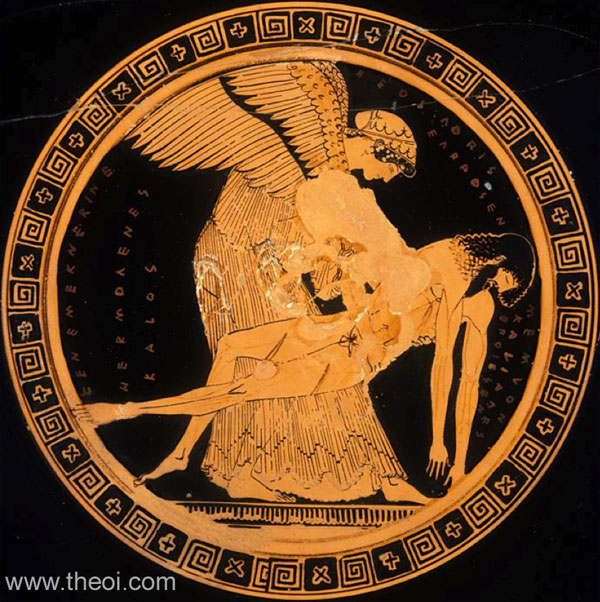
Philostratus the Elder, Imagines 1. 7 (trans. Fairbanks) (Greek rhetorician C3rd A.D.) :
"[Ostensibly a description of an ancient Greek painting at Neapolis (Naples) :] This is the army of Memnon; their arms have been laid aside, and they are laying out the body of their chief for mourning; he has been struck in the breast, I think, by the ashen spear . . . it is Memnon, the son of Eos (the Dawn), who is being mourned. When he came to the defence of Troy, [Akhilleus (Achilles)] the son of Peleus, they say, slew him, mighty though he was and likely to be no whit inferior to his opponent. Notice to what huge length he lies on the ground, and how long is the crop of curls . . . You would not say that Memnon's skin is really black, for the black of it shows a trace of ruddiness.
As for the deities of the sky (daimones meteôroi), Eos (the Dawn) mourning over her son causes Helios (the Sun) to be downcast and begs Nyx (Night) to come prematurely and check the hostile army, that she may be able to steal away her son, no doubt with the consent of Zeus. And look! Memnon has been stolen away and is at the edge of the painting. Where is he? In what part of the earth? No tomb of Memnon is anywhere to be seen but in Aithiopia (Ethiopia) he himself has been transformed into a statue of black marble [i.e. a colossal statue on the upper Nile, still extant]. The attitude is that of a seated person, but he figure is that of Memnon yonder, if I mistake not, and the ray of Helios (the Sun) falls on the statue. For Helios (the Sun), striking the lips of Memnon as a plectrum strikes the lyre, seems to summon a voice from them, and by this speech-producing artifice consoles Hemera (the Day) [i.e. Eos]."
Callistratus, Descriptions 1 (trans. Fairbanks) (Greek rhetorician C4th A.D.) :
"When we saw this statue we could well believe that the Aithiopian (Ethiopian) stone statue of Memnon also became vocal, the Memnon, who when Hemera (Day) [i.e. Eos] came was filled with joy by her presence, and overcome by distress when she departed, groaned with grief--the only stone figure that has been moved by the presence of joy and sadness to depart from its natural dumbness, so far overcoming its insensibility as to gain the power of speech."
Callistratus, Descriptions 9 :
"On the statue of Memnon. I wish to describe to you the miracle of Memnon also; for the art it displayed was truly incredible and beyond the power of human hand. There was in Aithiopia (Ethiopia) an image of Memnon, the son of Tithonos (Tithonus), made of marble . . . but stone though it was it had the power of speech. For at one time it saluted rising Hemera (Day) [i.e. Eos], by its voice giving token of its joy and expressing delight at the arrival of its mother; and again, as day declined to night, it uttered piteous and mournful groans in grief at her departure. Nor yet was the marble at a loss for tears, but they too were at hand to serve its will . . . The statue in question both lulled to rest the sorrows of Hemera (Day) and caused her to abandon her search for her son, as though the art of the Aithiopes (Ethiopians) were compensating her by means of the statue for the Memnon who had been snatched away from her by fate."
Ovid, Metamorphoses 5. 376 ff (trans. Melville) (Roman epic C1st B.C. to C1st A.D.) :
"Aurora [Eos], who had favoured Troy's arms too . . . a closer trouble, a family grief, had wrung her heart, the loss of Memnon. Slaughtered by Achilles' spear, she, his bright golden mother, saw him dead upon the plain of Troy. The rosy blush that dyes the hour of dawn grew pale and clouds hid the bright heavens. But when his limbs were laid on the last flames, she could not bear to look. With hair unbound, just as she was, she knelt (nor did her pride disdain) before the knees of mighty Jove [Zeus] and pleaded through her tears : ‘Least I may be of all the goddesses the golden heavens hold (in all the world my shrines are rarest), yet a deity I am, and I have come not for a gift of fanes or altar-fires or holy days; though should you see how great the services I, but a woman, give when I preserve at each new dawn the boundaries of night, you'd judge some guerdon due. But it's not now Aurora's [Eos'] errand nor her care to claim honours well-earned. I come because my son, Memnon, is lost, who for his uncle's [King Priamos (Priam) of Troy's] sake in vain bore valiant arms and in his first youth (so you willed it) fell to brave Achilles. Grant him, I pray, Ruler of Heaven most high, some honour, solace that he had to die, and soothe a wounded mother's misery!’
Juppiter [Zeus] nodded his assent as Memnon's pyre fell to the leaping flames. Black rolling smoke darkened the daylight, as a stream breathes forth the mist it breeds that lets no sunlight through. Up flew black ashes, and they clustered thick into a single mass, which took a shape and from the fire drew heat and breath of life. Its lightness gave it wings and like a bird at first, and presently a real bird, its great wings whirred and with it sister-birds whirred beyond counting, all from the same source. Three times they circled round the pyre; three times their cries, united, echoed through the air. One the fourth flight the flock split up; then two fierce legions, so divided, fought each other with claws and beaks in full fury, till their wings and battling breasts were weary; then they fell, death-offerings, on the ash whose kin they were, recalling that brave soul from whom they sprang. He who begot them gave those sudden birds their name ‘Memnonides’ ; and when the sun has coursed through the twelve signs, they fight again to die in memory of Memnon slain . . . Aurora intent on her own grief : now still her loving sorrow she renews and with her tears the whole wide world bedews."
Virgil, Aeneid 8. 384 ff (trans. Day-Lewis) (Roman epic C1st B.C.) :
"[Aphrodite addresses Hephaistos (Hephaestus) :] ‘You were moved by the tears of Thetis once, and the tears of the wife of Tithonus [i.e. Eos, who requested armour for her son Memnon].’"
Seneca, Troades 238 ff (trans. Miller) (Roman tragedy C1st A.D.) :
"[Akhilleus' (Achilles')] glorious deeds : Hector lies low, slain before his father's eyes, and Memnon before his uncle's, in sorrow for whose death his mother [Eos the Dawn] with wan face ushered in a mournful day, while the victor shuddered at the lesson of his own work, and Achilles learned that even sons of goddesses can die."
Tryphiodorus, Taking of Ilias 30 ff (trans. Mair) (Greek poet C5th A.D.) :
"For the fate of Memnon Eos (Dawn), his mother, hung aloft a cloud in heaven and stole away the light of shamefast day."
EOS GODDESS OF THE DAWN
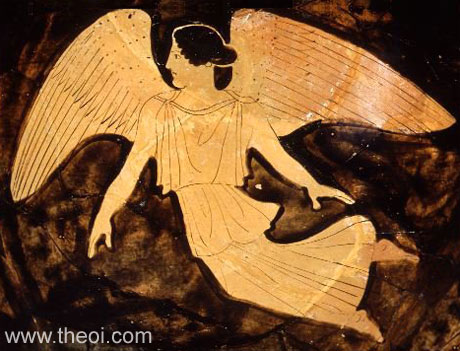
Homer, Iliad 1. 477 ff (trans. Lattimore) (Greek epic C8th B.C.) :
"When the young Eos (Dawn) showed again with her rosy fingers."
Homer, Iliad 2. 48 ff :
"The goddess Eos (Dawn) drew close to tall Olympos with her message of light to Zeus and the other immortals."
Homer, Iliad 8. 1 & 24. 695 :
"Eos (Dawn) the yellow-robed scattered over all the earth."
Homer, Iliad 11. 1 ff :
"Eos (Dawn) rose from her bed, where she lay by haughty Tithonos (Tithonus), to carry her light to men and to immortals."
Homer, Iliad 19. 1 ff :
"Eos (Dawn) the yellow-robed arose from the river of Okeanos (Oceanus) to carry her light to men and to immortals."
Homer, Odyssey Odyssey 2. 1, et al (trans. Shewring) (Greek epic C8th B.C.) :
"Eos (Dawn) comes early, with rosy fingers." [N.B. This phrase occurs a number of times in the Odyssey.]
Homer, Odyssey 5. 1 ff :
"The goddess Eos (Dawn), who had slept beside Lord Tithonos (Tithonus), was rising now to bring light to immortals and to mortals."
Homer, Odyssey 5. 390 & 10. 144 :
"When Eos (Dawn) of the braided tresses had ushered in the third day."
Homer, Odyssey 6. 48 ff :
"Forthwith came Eos (Dawn) in her flowery garment."
Homer, Odyssey 10. 540, et. al. :
"Eos (Dawn) appeared in her flowery cloth of gold."
Homer, Odyssey 12. 1 ff :
"The ship [of Odysseus] in due course left the waters of the river Okeanos (Oceanus) and reached the waves of the spacious sea and the island of Aiaia (Aeaea); it is there [Okeanos] that Eos the early-comer (Erigeneia) has her dwelling place and her dancing grounds, and the sun himself has his risings. We came came in; we beached our vessel upon the sands and disembarked upon the sea-shore; there we fell fast asleep, awaiting ethereal Dawn."
Homer, Odyssey 13. 93 ff :
"That brightest of stars appeared [Eosphoros the Dawn-Star] that most often heralds the light of early-rising Dawn (Eos Erigineia)."
Homer, Odyssey 22. 195 ff :
"Eos (Dawn) in her broidered robe as she rises from the streams of Okeanos (Oceanus)."
Homer, Odyssey 23. 244 ff :
"Rosy-fingered Dawn (Eos) when she appeared might have found them still in melting mood, but Athene (Athena) of the gleaming-eyes turned her thought to another stratagem. She held back the night to linger long at the horizon, checking Eos of the broidered robe at the edge of Okeanos (Oceanus) and bidding her not to yoke as yet the rapid horses that bring men light, Lampos (Lampus) and Phaithon (Phaethon), the young steeds of Eos . . . When it seemed to her [Athene] that Odysseus had has heart's content of both love and sleep, forthwith she roused up Eos (Dawn) of the broidered robe from Okeanos to bring light to mankind again."
Hesiod, Theogony 404 (trans. Evelyn-White) (Greek epic C8th or C7th B.C.) :
"The light of all-seeing Eos the Dawn."
Homeric Hymn 3 to Hermes 326 ff (trans. Evelyn-White) (Greek epic C7th - 4th B.C.) :
"There was an assembly on snowy Olympos (Olympus), and the immortals who perish not were gathering after the hour of gold-throned (khrysothronon) Eos."
Mimnermus, Fragment 12 (trans. Gerber, Vol. Greek Elegiac) (Greek elegy C7th B.C.) :
"For Helios the Sun's lot is toil . . . from the moment rose-fingered Eos (the Dawn) leaves Okeanos (Oceanus) and goes up into the sky."
Sappho, Fragment 6 (trans. Campbell, Vol. Greek Lyric I) (C6th B.C.) :
"Lady (potnia) Eos . . . golden-armed (khrysopakhos)."
Sappho, Fragment 103 :
"Golden-sandaled (khrysopedillos) Auos (Eos)."
Sappho, Fragment 104 :
"Hesperos (Hesperus, Evening Star), bringing everything that shining Auos (Eos, Dawn) scattered, you bring the sheep, you bring the goat, you bring back the child to its mother."
Sappho, Fragment 157 :
"Lady Auos (Eos)."
The Anacreontea, Fragment 35 (trans. Campbell, Vol. Greek Lyric II) (C5th B.C.) :
"Rosy-fingered Eos."
TBA (trans. Campbell, Vol. Greek Lyric II) (B.C.) :
"For the Pleiades, as we carry a plough to Orthria (Goddess of the Morning Twilight) [Eos], rise through the ambrosial night like the star Seirios (Sirius)."
Alcman, Fragment 1 (trans. Campbell, Vol. Greek Lyric II) (C7th B.C.) :
"I long to please Aotis (Eos, Dawn) most of all, for she proved the healer of our sufferings.”
Corinna, Fragment 690 (trans. Campbell, Vol. Greek Lyric II) (C6th B.C.) :
"Aas (Eos), leaving the waters of Okeanos (Oceanus), drew from the sky the moon's holy light."
Ibycus, Fragment 284 (trans. Campbell, Vol. Greek Lyric III) (C5th B.C.) :
"When white-cheeked Aos (Eos, Dawn) climbs the heavens, early-born (Erigeneia)."
Bacchylides, Fragment 5 (trans. Campbell, Vol. Greek Lyric IV) (C5th B.C.) :
"Gold-armed (khrysopakhos) Aos (Eos, Dawn)."
Bacchylides, Fragment 13 :
"On a dark-blossoming sea Boreas (the North Wind) rends men's hearts with the billows, coming face to face with them as night rises up, but ceases on the arrival of Aos (Eos, Dawn) who gives light to mortals and a gentle breeze levels the sea, and they belly out their sail before Notos' (Notus the South Wind's) breath."
Bacchylides, Fragment 17 :
"The lovely light of immortal Aous (Eos, Dawn)."
Bacchylides, Fragment 20C :
"White-horsed Aos (Eos, Dawn) as she brings light to men looks down."
Pseudo-Apollodorus, Bibliotheca 1. 35 (trans. Aldrich) (Greek mythographer C2nd A.D.) :
"When Ge (Gaea, Earth) learned of this, she sought a drug that would prevent their [the Gigantes] destruction even by mortal hands. But Zeus barred the appearance of Eos (the Dawn), Selene (the Moon), and Helios (the Sun), and chopped up the drug himself before Ge could find it."
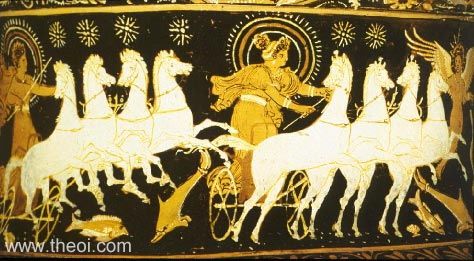
Apollonius Rhodius, Argonautica 1. 519 ff (trans. Rieu) (Greek epic C3rd B.C.) :
"Radiant Eos (Dawn) with her bright eyes beheld the towering crags of Pelion [ie the mountain was touched by the light of Dawn]."
Apollonius Rhodius, Argonautica 1. 1280 ff :
"At the hour when bright-eyed Eos (Dawn) comes up to light the eastern sky, and all the paths stand out and the fields glisten with dew."
Apollonius Rhodius, Argonautica 3. 1224 ff :
"Eos (Dawn) arrived, showing herself betimes above the snows of Kaukasos (Caucasus)."
Apollonius Rhodius, Argonautica 4. 1170 ff :
"Eos' (Dawn's) celestial beams chased black Nyx (Night) from the sky."
Theocritus, Idylls 2. 145 ff (trans. Rist) (Greek bucolic C3rd B.C.) :
"Eos' (Dawn's) horses went racing up the sky today, bearing her all rosy from Okeanos' (Oceanus') bed."
Quintus Smyrnaeus, Fall of Troy 1. 48 ff (trans. Way) (Greek epic C4th A.D.) :
"As when descends Eos (Dawn) from Olympos' crest of adamant, Eos, heart-exultant in her radiant steeds amidst the bright-haired Horai (Horae, Hours); and o'er them all, how flawless-fair soever these may be, her splendour of beauty glows pre-eminent."
Quintus Smyrnaeus, Fall of Troy 2. 115 ff :
"[Memnon greets King Priamos (Priam) of Troy :] Telling of that strange immortality by Eos (Dawn-goddess) given to his sire [Tithonos], telling of the unending flow and ebb of Tethys, of the sacred flood of Okeanos (Oceanus) fathomless-rolling, of the bounds of Earth that wearieth never of her travail, of where the Sun-steeds leap from orient waves."
Quintus Smyrnaeus, Fall of Troy 2. 185 ff :
"Phaesphoros Erigeneia (the Early-Born Light-Bringer) [Eos] . . . began to climb Heaven's broad highway."
Quintus Smyrnaeus, Fall of Troy 5. 395 ff :
"From Okeanos (Oceanus) then uprose Eos (Dawn) golden-reined: like a soft wind upfloated Hypnos (Sleep) to heaven."
Quintus Smyrnaeus, Fall of Troy 6. 1 ff :
"Rose Eos (Dawn) from Okeanos (Oceanus) and Tithonos' bed, and climbed the steeps of heaven, scattering round flushed flakes of splendour."
Quintus Smyrnaeus, Fall of Troy 7. 1 ff :
"Heaven hid his stars, and Eos (Dawn) awoke outspraying splendour, and night's darkness fled."
Quintus Smyrnaeus, Fall of Troy 11. 350 ff :
"O'er the streams of Okeanos (Oceanus) Eos (Dawn) drove up her splendour-flashing steeds."
Quintus Smyrnaeus, Fall of Troy 14. 1 ff :
"Then rose from Okeanos (Oceanus) Eos (Dawn) the golden-throned up to the heavens; Nyx (Night) into Khaos (Chaos) sank."
Quintus Smyrnaeus, Fall of Troy 14. 228 ff :
"To wide heaven Erigeneia (the Child of Mist) [Eos] uprose, scattering night, unveiling earth and air."
Orphic Hymn 78 to Eos (trans. Taylor) (Greek hymns C3rd B.C. to 2nd A.D.) :
"To Eos, Fumigation from Manna. Hear me, O Goddess, whose emerging ray leads on the broad refulgence of the day; blushing Eos (Dawn), whose celestial light beams on the world with reddening splendours bright. Messenger of Titan [Helios the Sun], whom with constant round thy orient beams recall from night profound: labour of every kind to lead it thine, of mortal life the minister divine. Mankind in thee eternally delight, and none presumes to shun thy beauteous sight. Soon as they splendours break the bands of rest, and eyes unclose, with pleasing sleep oppressed; men, reptiles, birds, and beasts, with general voice, and all the nations of the deep rejoice; for all the culture of our life is thine. Come, blessed power, and to these rites incline: thy holy light increase, and unconfined diffuse its radiance on the mystics' mind."
Ovid, Metamorphoses 2. 112 ff (trans. Melville) (Roman epic C1st B.C. to C1st A.D.) :
"Aurora (Dawn) [Eos], watchful in the reddening dawn, threw wide her crimson doors and rose-filled halls; the Stellae (Stars) [Astra] took flight, in marshalled order set by Lucifer [Eosphoros] who left his station last. Then, when Titan [Helios the Sun] . . . saw the world in crimson sheen [he rose into the sky]."
Ovid, Metamorphoses 3. 150 ff :
"When Aurora (Dawn) [Eos] on saffron wheels leads on another day, we'll start our work again."
Ovid, Metamorphoses 4. 627 ff :
"Until Lucifer [Eosphoros the Morning Star] hould wake Aurora (Dawn) [Eos], and Aurora call forth the chariot of the day [Helios the Sun]."
Ovid, Metamorphoses 5. 446 ff :
"Aurora (Dawn) [Eos] rising with dewy hair."
Ovid, Metamorphoses 6. 48 ff :
"When Aurora (Dawn) [Eos] rises in the dawn, the eastern sky is red and, as the sun climbs, in a little while is pale again."
Ovid, Metamorphoses 7. 100 ff :
"Now Aurora (Dawn) [Eos] has put the twinkling stars to flight."
Ovid, Metamorphoses 7. 207 ff :
"[Medea the witch cries out to the sky gods :] ‘Thee too, bright Luna (Moon) [Selene], I banish, though thy throes the clanging bronze assuage; under my spells even my grandsire's [Helios the Sun's] chariot grows pale and Aurora (Dawn) [Eos] pales before my poison's power.’
Ovid, Metamorphoses 13. 576 ff :
"[Aurora Eos the dawn speaks :] ‘I, but a woman, preserve at each new dawn the boundaries of night.’"
Ovid, Metamorphoses 13. 576 ff :
"Aurora (Dawn) [Eos] intent on her own grief [for her dead son Memnon] : now still her loving sorrow she renews and with her tears the whole wide world bedews."
Ovid, Metamorphoses 15. 88 ff :
"When on his milk-white steed Luciferus [Eosphoros the Morning Star] rides forth, or when, bright harbinger of day, Aurora (Dawn) [Eos] gilds the globe to greet the sun."
Ovid, Fasti 3. 403 ff (trans.Boyle) (Roman poetry C1st B.C. to C1st A.D.) :
"Tithonus' wife [Aurora-Eos] drops dew from her saffron cheeks and drives the time of the fifth morning."
Ovid, Fasti 4. 373 ff :
"When Pallantis [Eos the Dawn] next gleams in heaven and stars flee and Luna's [Selene the Moon's] snow-white horses are unhitched."
Ovid, Fasti 4. 713 ff :
"Memnon's saffron mother [Eos the Dawn] arrives to view the widening earth on rosy horses."
Ovid, Fasti 5. 159 ff :
"Hyperion's daughter [Eos the Dawn] expels the stars and lifts her rose lamp on the morning's horses, cold Argestes (the North-West wind) will caress the topmost ears of corn."
Ovid, Heroides 16. 201 ff (trans. Showerman) (Roman poetry C1st B.C. to C1st A.D.) :
"Aurora (Dawn) [Eos] . . . the goddess who sets the last bound to the advance of night."
Ovid, Heroides 18. 111 ff :
"And now Aurora (Dawn) [Eos], the bride of Tithonus, was making ready to chase the night away, and Lucifer [Eosphorus the Dawn Star] had risen, forerunner of the dawn."
Virgil, Aeneid 4. 12 ff (trans. Day-Lewis) (Roman epic C1st B.C.) :
"Aurora (Dawn) [Eos] had chased from heaven the dewy darkness, was carrying the sun's torch far and wide over the earth."
Virgil, Aeneid 4. 585 ff :
"And now was Aurora (Dawn) [Eos], leaving the saffron bed of Tithonus, beginning to shower upon earth the light of another day."
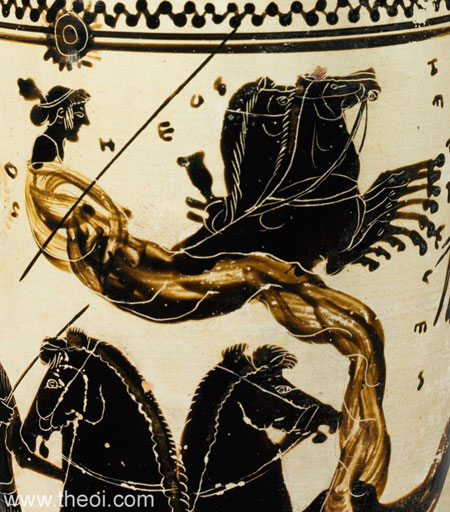
Virgil, Georgics 1.246 ff (trans. Fairclough) (Roman bucolic C1st B.C.) :
"There [beneath the earth], men say, is either the silence of lifeless night, and gloom ever thickening beneath night's pall; Aurora (Dawn) [Eos] returns from us and brings them back the day, and when on us rising Sol (Sun) [Helios] first breathes with panting steeds, there glowing Vesper [Hesperos the Evening Star] is kindling his evening rays [i.e. when dawn arrives in the upper world, evening comes to netherworld Elysium, and vice versa]."
Seneca, Hercules Furens 882 ff (trans. Miller) (Roman tragedy C1st A.D.) :
"From the land of Aurora (Dawn) [Eos] [i.e. the far East] to Hesperus (the evening star) [the far West], and where the sun, holding mid-heaven, gives to shapes no shadows."
Valerius Flaccus, Argonautica 1. 310 ff (trans. Mozley) (Roman epic C1st A.D.) :
"Tithonus' bounteous wife [Auora-Eos the Dawn], ruffling the sea with the new-born sunlight."
Valerius Flaccus, Argonautica 2. 72 ff (trans. Mozley) (Roman epic C1st A.D.) :
"The fires of the maid Pallantis [Aurora-Eos the Dawn] grow faint in the east, the land lightens."
Valerius Flaccus, Argonautica 3. 1 ff :
"Tithonus' bride [Aurora-Eos the Dawn] dissolved the chill shadows and uncurtained the heavens."
Statius, Thebaid 2. 134 ff (trans. Mozley) (Roman epic C1st A.D.) :
"And now Aurora (Dawn) [Eos] rising from her Mygdonian [her husband Tithonos'] resting-place had scattered the cold shadows from the high heaven, and shaking the dew-drops from her hair blushed deep in the sun's pursuing beams; toward her through the clouds rosy Lucifer [Eosphoros the Morning-Star] turns his late fires, and with slow steed leaves an alien world, until the fiery father's [Helios the sun's] orb be full replenished and he forbid his sister to usurp his rays."
Statius, Thebaid 6. 25 ff :
"The bright consort of Tithonus [Aurora-Eos the Dawn] had shown in heaven her toil-bringing car, and Nox [Nyx, Night] and Somnus [Hypnos, Sleep] with empty [sleep-inducing] horn were fleeing from the pale goddess' wakeful reins."
Statius, Thebaid 8. 271 ff :
"It was the time when Phoebus' [Helios the Sun's] fiery sister [Aurora-Eos the Dawn], hearing the sound of his yoked steeds and the roar of Oceanus' cavernous abode beneath the gathering dawn, collects her straying beams and with light flick of whip chases the stars away."
Statius, Thebaid 12. 1 ff :
"Not ye had the wakeful dawn put all the stars to flight from heaven, and Luna (Moon) [Selene] was beholding the approach of day with fading horn, what time Tithonia [Aurora-Eos the Dawn] scatters the clouds in hurrying rout, and prepares the wide firmament for the return of Phoebus [Helios the Sun]."
Statius, Silvae 5. 4. 1 (trans. Mozley) (Roman poetry C1st A.D.) :
"So oft hath Tithonia [Eos the Dawn] passed by my groans [from lack of sleep], and pitying sprinkled me with her cool whip [the dewy whip with which she chases away the stars]."
Apuleius, The Golden Ass 3. 1 ff (trans. Walsh) (Roman novel C2nd A.D.) :
"Aurora (Dawn) [Eos] with her crimson trapping brandished her rosy arm and began to driver her chariot across the sky."
Tryphiodorus, The Taking of Ilias 670 ff (trans. Mair) (Greek poet C5th A.D.) :
"Eos (Dawn) in her car was just speeding back from Okeanos (Oceanus) in the East and marking great space of sky with slowly brightening light, dispelling night."
Nonnus, Dionysiaca 7. 280 ff (trans. Rouse) (Greek epic C5th A.D.) :
"[Zeus addresses Helios the Sun:] ‘I will hide you and the daughter of the mists [Eos the Dawn] together in my clouds, and when you are covered Nyx (Night) will appear in the daytime.’"
Nonnus, Dionysiaca 27. 1 ff :
"Eos (the Dawn) had just shaken off the wing of carefree sleep and opened the gates of sunrise, leaving the lightbringing couch of Kephalos (Cephalus)."
Nonnus, Dionysiaca 34. 124 ff :
"Farshooting Eos (Dawn) with crimson face leapt up sending forth her light."
Nonnus, Dionysiaca 37. 70 ff :
"The Wind [Euros the East Wind] left the rosy chamber of Eos (Dawn) his mother."
Nonnus, Dionysiaca 37. 86 ff :
"But when morning, the harbinger of Eos' (Dawn's) dewy car, scored the night with his ruddy gleams, then all awoke."
HYMNS TO EOS
Orphic Hymn 78 to Eos (trans. Taylor) (Greek hymns C3rd B.C. to 2nd A.D.) :
"To Eos, Fumigation from Manna. Hear me, O Goddess, whose emerging ray leads on the broad refulgence of the day; blushing Eos (Dawn), whose celestial light beams on the world with reddening splendours bright. Messenger of Titan [Helios the Sun], whom with constant round thy orient beams recall from night profound: labour of every kind to lead it thine, of mortal life the minister divine. Mankind in thee eternally delight, and none presumes to shun thy beauteous sight. Soon as they splendours break the bands of rest, and eyes unclose, with pleasing sleep oppressed; men, reptiles, birds, and beasts, with general voice, and all the nations of the deep rejoice; for all the culture of our life is thine. Come, blessed power, and to these rites incline: thy holy light increase, and unconfined diffuse its radiance on the mystics' mind."
CULT OF EOS
Ovid, Metamorphoses 13. 576 ff (trans. Melville) (Roman epic C1st B.C. to C1st A.D.) :
"[Eos addresses Zeus :] ‘Least I may be of all the goddesses the golden heavens hold--in all the world my shrines are rarest.’" [N.B. Perhaps Ovid had heard of a few rare shrines dedicated to the goddess.]
POETIC TITLES & EPITHETS
Eos had a number of poetic titles and epithets.
Greek Name
Ηριγενεια
Ορθρια
Ἡμερα
Τιτω
Transliteration
Êrigeneia
Orthria
Hêmera
Titô
Latin Spelling
Erigeneia
Orthria
Hemera
Tito
Translation
Early-Born (êri-, genos)
Morning-Twilight (orthros)
Day (hêmera)
Day (titô)
Greek Name
Ροδοδακτυλος
Ροδοπαχυς
Transliteration
Rhododaktylos
Rhodopakhus
Latin Spelling
Rhododactylus
Rhodopachus
Translation
Rosy-Fingered, Rosy-Armed (rhodos, daktylos, pakhus)
Greek Name
Χρυσοπαχυς
Φαεσφορος
Κροκοπεπλος
Transliteration
Khrysopakhus
Phaesphoros
Krokopeplos
Latin Spelling
Chrysopachus
Phaesphorus
Crocopeplos
Translation
Golden-Armed (khrysos, pakhus), Light-Bringer (phaethô, phoros), Saffron-Robed (krokos, peplos)
ANCIENT GREEK ART
SOURCES
GREEK
- Homer, The Iliad - Greek Epic C8th B.C.
- Homer, The Odyssey - Greek Epic C8th B.C.
- Hesiod, Theogony - Greek Epic C8th - 7th B.C.
- The Homeric Hymns - Greek Epic C8th - 4th B.C.
- Epic Cycle, The Aethiopis Fragments - Greek Epic C8th B.C.
- Pindar, Odes - Greek Lyric C5th B.C.
- Greek Lyric I Alcman, Fragments - Greek Lyric C7th B.C.
- Greek Lyric I Sappho, Fragments - Greek Lyric C6th B.C.
- Greek Lyric II Anacreontea, Fragments - Greek Lyric C5th - 4th B.C.
- Greek Lyric III Ibycus, Fragments - Greek Lyric C6th B.C.
- Greek Lyric IV Bacchylides, Fragments - Greek Lyric C5th B.C.
- Greek Lyric IV Corinna, Fragments - Greek Lyric C5th B.C.
- Greek Elegaic Mimnermus, Fragments - Greek Elegaic C7th B.C.
- Aeschylus, Fragments - Greek Tragedy C5th B.C.
- Apollodorus, The Library - Greek Mythography C2nd A.D.
- Apollonius Rhodius, The Argonautica - Greek Epic C3rd B.C.
- Theocritus, Idylls - Greek Idyllic C3rd B.C.
- Callimachus, Fragments - Greek Poetry C3rd B.C.
- Lycophron, Alexandra - Greek Poetry C3rd B.C.
- The Orphic Hymns - Greek Hymns C3rd B.C. - C2nd A.D.
- Antoninus Liberalis, Metamorphoses - Greek Mythography C2nd A.D.
- Aelian, On Animals - Greek Natural History C2nd - 3rd A.D.
- Athenaeus, Deipnosophistae - Greek Rhetoric C3rd A.D.
- Philostratus the Elder, Imagines - Greek Rhetoric C3rd A.D.
- Callistratus, Descriptions - Greek Rhetoric C4th A.D.
- Quintus Smyrnaeus, Fall of Troy - Greek Epic C4th A.D.
- Tryphiodorus, The Taking of Ilias - Greek Epic C5th A.D.
- Nonnus, Dionysiaca - Greek Epic C5th A.D.
ROMAN
- Hyginus, Fabulae - Latin Mythography C2nd A.D.
- Hyginus, Astronomica - Latin Mythography C2nd A.D.
- Ovid, Metamorphoses - Latin Epic C1st B.C. - C1st A.D.
- Ovid, Fasti - Latin Poetry C1st B.C. - C1st A.D.
- Ovid, Heroides - Latin Poetry C1st B.C. - C1st A.D.
- Virgil, Aeneid - Latin Epic C1st B.C.
- Virgil, Georgics - Latin Bucolic C1st B.C.
- Propertius, Elegies - Latin Elegy C1st B.C.
- Seneca, Hercules Oetaeus - Latin Tragedy C1st A.D.
- Seneca, Troades - Latin Tragedy C1st A.D.
- Valerius Flaccus, The Argonautica - Latin Epic C1st A.D.
- Statius, Thebaid - Latin Epic C1st A.D.
- Statius, Silvae - Latin Poetry C1st A.D.
- Apuleius, The Golden Ass - Latin Novel C2nd A.D.
BYZANTINE
- Suidas, The Suda - Byzantine Greek Lexicon C10th A.D.
OTHER SOURCES
Other references not currently quoted here: Horace Carm. 1.22.8 & 2.16.30, Servius on Vergil's Aeneid 1.447 & 3.328.
BIBLIOGRAPHY
A complete bibliography of the translations quoted on this page.
